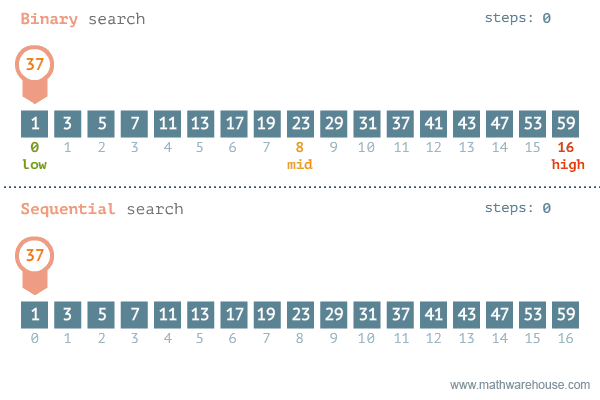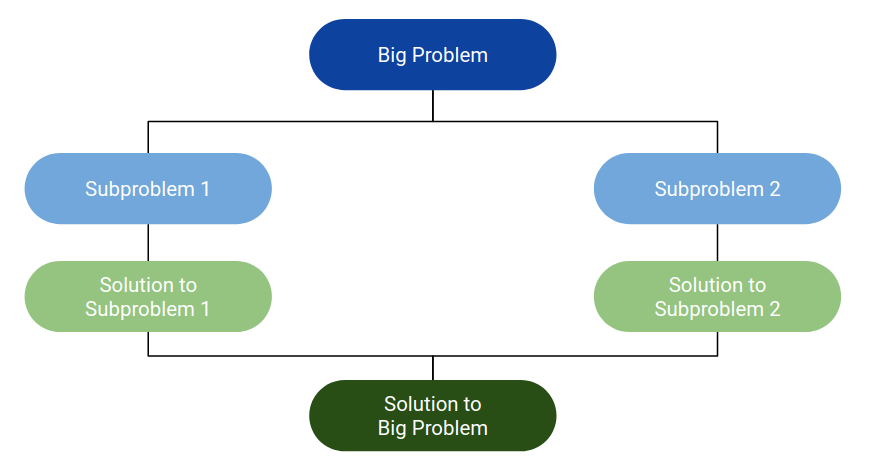# Searching and Recursion --- CS 65 // 2021-04-20 <!--=====================================================================--> ## Administrivia - Project proposal due Thursday <!--=====================================================================--> # Questions ## ...about anything? <!--=====================================================================--> <!-- .slide: data-background="#004477" --> # Searching <!--=====================================================================--> # Searching - Suppose you have a **phonebook** in your hands - How do you go about searching for a name? <!----------------------------------> ## Formalizing the Problem ```py def search(val, lst): """Finds the index of val in lst or -1 if not found Parameters: val: an object lst: a list Returns: index: an int Postconditions: if lst contains val, then lst[index] == val otherwise index == -1 """ ``` - <!-- .element: class="fragment"--> How would you implement this function? <!--=====================================================================--> ## Linear Search ```py def search(val, lst): """Finds the index of val in lst or -1 if not found""" for index, value in enumerate(lst): if value == val: return index return -1 ``` - This approach looks at each name, one after the other, until I find the one I am looking for - <!-- .element: class="fragment"--> It is also how the `lst.index(val)` method is implemented <!--=====================================================================--> # Can we do better? - <!-- .element: class="fragment"--> No! - <!-- .element: class="fragment"--> Linear search is optimal if the items are **unsorted**. - <!-- .element: class="fragment"--> What if the items are **sorted**? <!----------------------------------> ## An Idea: Using Sortedness 1. Look at a name in the middle of the phonebook 2. <!-- .element: class="fragment"--> If it is the name I am looking for, I'm done! 3. <!-- .element: class="fragment"--> If the name I want **comes after** the middle name - <!-- .element: class="fragment"--> Ignore the names to the left - <!-- .element: class="fragment"--> Goto step 1 to continue searching the right-half 4. <!-- .element: class="fragment"--> If the name I want **comes before** the middle name - <!-- .element: class="fragment"--> Ignore the names to the right - <!-- .element: class="fragment"--> Goto step 1 to continue searching the left-half <!--=====================================================================--> <!-- .slide: data-background="#004477" --> # Binary Search <!--=====================================================================--> ## Binary Search Pseudocode ```py[1-7|8|9-10|11-12|13-14|1-14] def binary_search(val, lst): """Finds the index of val in lst or -1 if not found Preconditions: lst is sorted using < (ascending order) val < x is defined for each x in lst """ # mid = the middle element of lst # if mid == val, then # return the index of mid # else if mid < val, then # continue searching the right half # else # continue searching the left half ``` <!----------------------------------> ## Binary Search Pseudocode - How will we keep track of the part of the `lst` that still needs to be searched? - <!-- .element: class="fragment"--> **Idea:** have `low` and `high` variables that keeps track of the range of indices  <!-- .element: class="fragment"--> **Credit:** www.mathwarehouse.com <!-- .element: class="fragment"--> <!----------------------------------> ## Binary Search Pseudocode ```py[1|2-3|4|5|6-7|8-9|10-11|13-14|1-14] def binary_search(val, lst): # low = first index of lst # high = last index of lst # while there are still elements in low...high: # mid = the middle index between low and high # if val == lst[mid]: # return mid # elif lst[mid] < val: # update low...high range to be right of mid # else: # update low...high range to be left of mid # # if we get here, there are no more elements to search # so we should return -1 ``` <!--=====================================================================--> ## Binary Search Implementation ```py def binary_search(val, lst): low = 0 # first index high = len(lst) -1 # last index while low <= high: # while at least one left mid = (high + low) // 2 # middle index if val == lst[mid]: # if we found val return mid # return its index elif val > lst[mid]: # if val is to the right low = mid + 1 # search to the right else: # if val is to the left high = mid - 1 # search to the left return -1 # no more elements ``` <!--=====================================================================--> <!-- .slide: data-background="#004477" --> # Searching Comparison <!--=====================================================================--> ## Searching Comparison - We've seen two strategies for searching for a value within a list 1. **Linear Search:** Looks at one element at a time until we find it 2. **Binary Search:** If the list is sorted, we can "zooms in" on the location of the value much quicker - <!-- .element: class="fragment"--> What do we mean by **quicker** though? + Is it twice as fast? Three times as fast? <!----------------------------------> ## Searching Comparison - One common way to compare the efficiency of searching algorithms is by comparing the **number of comparisons** each algorithm uses  <!-- .element: class="fragment"--> <!----------------------------------> ## Searching Comparison - What is the **worst case** number of comparisons required for each algorithm? + <!-- .element: class="fragment"--> For both algorithms, the worst case is when `lst` does not contain `val` so it has to do a lot of comparisons - <!-- .element: class="fragment"--> Suppose that `len(lst) = 1024` + <!-- .element: class="fragment"--> **Linear**: 1024 comparisons in worst case + <!-- .element: class="fragment"--> **Binary**: 10 comparisons in worst case <!----------------------------------> ## Searching Comparison - Now suppose that `len(lst) = 2048` + <!-- .element: class="fragment"--> **Linear**: 2048 comparisons in worst case + <!-- .element: class="fragment"--> **Binary**: 11 comparisons in worst case - <!-- .element: class="fragment"--> Finally, suppose that `len(lst) = $N$` + <!-- .element: class="fragment"--> **Linear**: `$N$` comparisons in worst case + <!-- .element: class="fragment"--> **Binary**: `$\log_2(N)$` comparisons in worst case <!--=====================================================================--> <!-- .slide: data-background="#004477" --> # Divide and Conquer Algorithms <!--=====================================================================--> ## Divide and Conquer Algorithms  <!----------------------------------> ## Divide and Conquer Algorithms 1. **Divide** big problem into smaller parts 2. **Solve** problems independently 3. **Combine** answers to yield solution to big problem <!----------------------------------> ## Divide and Conquer Algorithms - Suppose I’d like to write a function `sum(numbers)` that returns the **sum** of all the numbers in a list. - <!-- .element: class="fragment"--> We could implement this with a loop, but let’s try a different approach! - <!-- .element: class="fragment"--> Given list: `numbers = [5, 7, 3, 2, 9, 4]` - <!-- .element: class="fragment"--> How can we **divide** the list into easier subproblems? + <!-- .element: class="fragment"--> `sum([5, 7, 3]) + sum([2, 9, 4])` + <!-- .element: class="fragment"--> `5 + sum([7, 3, 2, 9, 4])` <!--=====================================================================--> <!-- .slide: data-background="#004477" --> # Recursion <!--=====================================================================--> ## Recursion - A **recursive** function is one that "refers to itself" - <!-- .element: class="fragment"--> In mathematics, recursive functions are used regularly - <!-- .element: class="fragment"--> You might recall the **factorial** function:  <!-- .element: class="fragment"--> <!----------------------------------> ## Recursion  - Python supports implementing functions recursively ```py def factorial(n): if n == 0: return 1 else: return n * factorial(n-1) ``` <!-- .element: class="fragment"--> <!----------------------------------> ## Recursion: Two Basic Parts - **Base Case**: + <!-- .element: class="fragment"--> The “when to stop” case of recursion + <!-- .element: class="fragment"--> (Usually the simplest conceivable subproblem) - <!-- .element: class="fragment"--> **Recursive Case**: + <!-- .element: class="fragment"--> Break the problem into smaller subproblems + <!-- .element: class="fragment"--> (Each subproblem should get "closer" to a base case) + <!-- .element: class="fragment"--> Solve the subproblems by making recursive calls + <!-- .element: class="fragment"--> Combine results into the answer <!--=====================================================================--> ## Adding Recursively - Recall that we can **divide** `[5, 7, 3, 2, 9, 4]` into smaller problems: + `sum([5, 7, 3]) + sum([2, 9, 4])` - What goes in the ???s to complete the algorithm? --- ```py def sum(numbers): if ???: # Base case return ??? else: mid = len(numbers) // 2 # Recursive case return ??? ``` <!----------------------------------> ## Adding Recursively ```py def sum(numbers): if len(numbers) == 0: return 0 else: mid = len(numbers) // 2 return sum(numbers[:mid]) + sum(numbers[mid:]) ``` ```py def sum(numbers): if len(numbers) == 0: return 0 else: return numbers[0] + sum(numbers[1:]) ``` <!--=====================================================================--> <!-- .slide: data-background="#004477" --> # Other Examples <!--=====================================================================--> ## Reversing a String - Suppose we want to write the function `reverse(s)` that takes a string and returns the **reversed** version of `s` + `reverse("abc")` should return `"cba"` - <!-- .element: class="fragment"--> How can we do this recursively? <!----------------------------------> ## Reversing a String - We need to think about two things: + <!-- .element: class="fragment"--> How can we **break up** the problem into one or more simpler subproblems? + <!-- .element: class="fragment"--> What is the **simplest** conceivable subproblem? <!----------------------------------> ## Reversing a String - **Observation**: these should be the same: + `reverse("abcdef")` + `reverse("bcdef") + "a"` - <!-- .element: class="fragment"--> The **subproblem** that is easier than the original + <!-- .element: class="fragment"--> Uses the fact that concatenating two strings is easy + <!-- .element: class="fragment"--> If we have a solution to the subproblem, we can solve the bigger problem with a simple use of `+` <!----------------------------------> ## Reversing a String <!-- NOTE TO SELF Before switching to this slide, have students come up with the s[-1] and the s[:-1] parts themselves --> - Here is a partial solution so far: ```py def reverse(s): """Reverses the string s""" return reverse(s[1:]) + s[0] ``` - <!-- .element: class="fragment"--> But we are missing the **base case** - <!-- .element: class="fragment"--> What is the simplest conceivable subproblem? + <!-- .element: class="fragment"--> **Idea**: a single character (or the empty string) <!----------------------------------> ## Reversing a String ```py def reverse(s): """Reverses the string s""" if len(s) <= 1: # if s is "a" return s # then "a" is its own reverse else: # if s is "abc", solve it with reverse("bc") + "a" return reverse(s[1:]) + s[0] ``` <!--=====================================================================--> ## Repeated Concatenation - Recall that `3*"ab"` in Python computes `"ababab"` - <!-- .element: class="fragment"--> Suppose we want to write it as a function: + `string_star(num, s)` + <!-- .element: class="fragment"--> `string_star(3, "ab")` should be `"ababab"` - <!-- .element: class="fragment"--> Two questions for you: + <!-- .element: class="fragment"--> What is the **simplest** form of the problem that we can immediately return the answer for? + <!-- .element: class="fragment"--> How can you **break up** the problem into one or more smaller subproblems? <!----------------------------------> ## Repeated Concatenation + Use the fact that the following are the same: * `string_star(3, "ab")` * `"ab" + string_star(2, "ab")` + <!-- .element: class="fragment"--> Use `num == 1` as the base case ```py def string_star(num, s): if num == 1: return s else: return s + string_star(num-1, s) ``` <!-- .element: class="fragment"-->